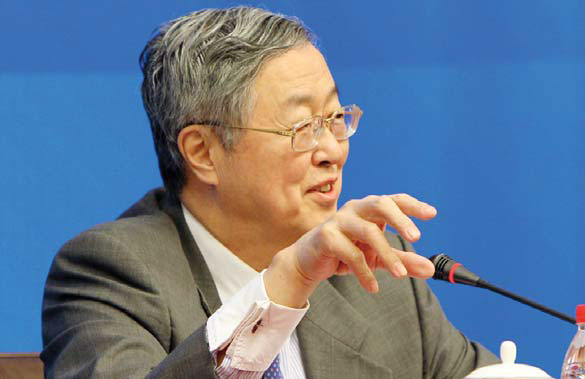Central bank chief dispels growth fears

Positive signs of shift to a consumption-driven GDP model with higher efficiency, he says
The Chinese government still has monetary policy tools to shore up economic growth and is not worried about decreasing foreign exchange reserves, according to Zhou Xiaochuan, governor of the central bank.
"Given the current Chinese and global economy, our monetary policy is prudent and relatively accommodative," he said ahead of the two-day G20 central bankers and finance ministers meeting that opened in Shanghai on Feb 26.
| Zhou Xiaochuan, governor of the central bank. |
"China still has some monetary policy (maneuvering) space and multiple policy instruments to address possible downside risks."
The G20 meeting focused on ensuring full, consistent and timely post-crisis reform. The agenda included discussions on prudent policy frameworks and tools, green finance, infrastructure investment and combating terrorist financing.
The Chinese economy grew 6.9 percent year-on-year in 2015, the slowest rate since 1990, sparking concerns that growth may continue to dip and contribute to the economic woes being felt by developed and emerging economies.
China's stock market tumble this year and the falling exchange rate of the renminbi, the central parity rate of which dropped to 6.53 against the US dollar on Feb 26 from about 6.1 in May, have increased market concerns.
"We will continue to adopt a stable monetary policy," Zhou said on Feb 26. "We will focus on maintaining healthy and stable domestic growth, and shifting to a new growth pattern against the backdrop of the new normal."
Economists expected the monetary authorities to further cut interest rates and lower banks' reserve requirement ratio to offset the downward pressure. But the benchmark interest rates have remained unchanged since October.
Zhou said the quality of China's growth has been improving. Consumption growth contributed 66.4 percent of GDP growth last year, while energy use per unit of GDP dropped 5.6 percent, showing positive signs of the shift to a consumption-driven growth model with higher efficiency.
He said China opposes using currency depreciation to make its exports more competitive, adding: "There is no basis for persistent yuan devaluation."
He also said the recent fluctuations in the yuan's exchange rate reflected the country's managed floating exchange rate regime, which is based on market supply and demand with reference to a currency basket. The dollar remained dominant and had the largest weight in the basket, he said.
The central bank governor noted the concerns on China's declining foreign reserves and capital outflows in recent months, but said the decline was normal and consistent with the ongoing economic restructuring that was aimed at achieving more-balanced growth.
China still has the world's largest foreign exchange reserve, but it dropped to $3.33 trillion (3.05 trillion euros) by the end of December - the lowest level since late 2011 and $110 billion less than a month ago, according to the central bank.
Zhou said while the proper level of reserves needed to be further discussed, China is able to cope with possible challenges. "Currently, there's nothing to worry about," he added.
Li Daokui, an economics professor at Tsinghua University and a former member of the central bank's monetary policy committee, was cited by Chinese media as saying that foreign reserves this year should not be lower than $3 trillion to stabilize the exchange rate of the yuan.
wuyiyao@chinadaily.com.cn
(China Daily European Weekly 03/04/2016 page25)
Today's Top News
- Factory activity sees marginal improvement in November
- Venezuela slams US' 'colonial threat' on its airspace
- Xi: Strengthen cyberspace governance framework
- Takaichi must stop rubbing salt in wounds, retract Taiwan remarks
- Millions vie for civil service jobs
- Chinese landmark trade corridor handles over 5m TEUs































